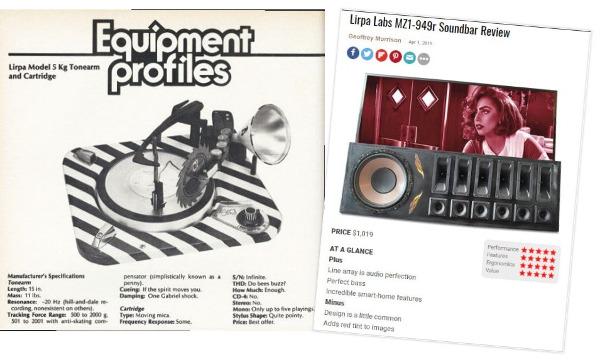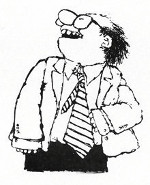A History of Lirpa Labs

In preparation for our April print edition , and in search of a subject for our retrospective flashback feature, I pressed deep into our 60-year archive for hints of the origin of Lirpa Labs and its mysterious, opinionated, and wildly creative founder, Loof Lirpa.
Many readers know that Loof and his often wacky products typically only appear in the weeks leading up to April, more often than not as we’re just going to press. I perused every April issue looking for a glimpse of him — every single one, dating back to our first year in 1958 when our predecessor HiFi & Music Review was in only its third edition. Despite my recollections of Lirpa from my time at Stereo Review in the mid-1990s, and those of my colleague (and former editor-in-chief) Bob Ankosko, I was unable to find even one reference in the magazine until our more modern history in the few years prior to our merge with Home Theater . Hmm...where was Loof?
So, I decided to check in with longtime contributor Ken Pohlmann, whose first articles in SR (aftermarket car audio reviews) date to 1988, and whose Signals column (it ran under different names through the years) goes back to 1989. Lirpa, he reminded me, made regular appearances in Audio magazine, at one time a sister publication to SR in the mid-1990s when I was first there, before ever appearing in Sound & Vision . Ah...that rang a bell. So I checked our Audio archive for as far back as I had on hand, and sure enough, in the April 1980 issue, there was a review of a 5-kilogram Lirpa tonearm and cartridge. That’s right, 11 pounds. Other Lirpa reviews may have appeared earlier. Credit for introducing Loof and his handiwork to our audiophile world, then, goes at least to longtime Audio editor Eugene Pitts III, (who can be found these days at The Audiophile Voice (audiophilevoice.com ), if not to one of his predecessors who enjoyed a shared sense of humor and was similarly adept at spelling backwards.
A casual web search of “Lirpa” brings up a number of quite varied references. Trekkies might know that a Lirpa is a traditional Vulcan weapon first seen in the original 1960s series — a staff with a fan-shaped blade on one side and a club for striking on the other. And urbandictionary.com says a Lirpa is “a person whose epidermis absorbs sun like a sponge, resulting in a potato-like coating.”
Beyond these, I found a few mentions at the website of The Museum of Hoaxes ( hoaxes.org ) of seasonal spring appearances by various entities bearing the name Lirpa Loof. For example, in 1984, That’s Life, a popular BBC television show in the U.K., ran a segment about a short, hairy, and extremely rare bipedal creature by that name who was introduced to visitors at the London Zoo; it had the habit of mimicking the motions of anyone who stood in front of it with remarkable accuracy and pooped purple nuggets, the result of it feeding on rhododendron flowers. Zoogoers peering into its cage had no idea it was a small person in a suit. (The video is available on YouTube.)
In 1961, the BBC advertised a radio concert by the “distinguished continental pianist” Lirpa Loof, but when listeners tuned in, the joke was on them. And in 1969, in the midst of the ongoing space race and with the U.S. poised to reach the moon, the Daily Journal newspaper in Kankakee, Illinois ran a most convincing item — complete with a photo — about a Soviet space capsule that had dropped from they sky and miraculously landed intact with three survivors out on North Hobbie Avenue. “One of the cosmonauts is thought to be Russian Lirpa Loof, missing for the past year,” the article read. Despite the hint, people drove to the site in hopes of seeing the downed spacecraft.
 All of this got me thinking about the role of humor in our hobby, or more precisely, the decided lack of it. Audiophiles and AV buffs know how passionate and serious we can get about all
this stuff, and how dry and deeply technical it can be. It’s nice that magazines like Audio offered an annual respite each April; a lovely tradition. But I realized that the work of Charles Rodrigues, whose clever cartoons graced the pages of this magazine from its first issue and were featured regularly thereafter, showed that founding editor Oliver Ferrell wanted us to acknowledge the lighter side of what we do and show we weren’t afraid to poke a little fun at ourselves. The artist’s ongoing presence for more than four decades only proved that the editors who followed Ferrell agreed. See our retrospective tribute to Rodrigues here.
All of this got me thinking about the role of humor in our hobby, or more precisely, the decided lack of it. Audiophiles and AV buffs know how passionate and serious we can get about all
this stuff, and how dry and deeply technical it can be. It’s nice that magazines like Audio offered an annual respite each April; a lovely tradition. But I realized that the work of Charles Rodrigues, whose clever cartoons graced the pages of this magazine from its first issue and were featured regularly thereafter, showed that founding editor Oliver Ferrell wanted us to acknowledge the lighter side of what we do and show we weren’t afraid to poke a little fun at ourselves. The artist’s ongoing presence for more than four decades only proved that the editors who followed Ferrell agreed. See our retrospective tribute to Rodrigues here.
Related:
























































